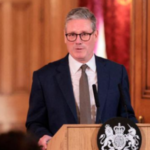The representatives of Kosovo and Serbia are expected to send their comments to the mediators of the European Union by July 18 about the way to implement the agreement on the normalization of relations, which the parties agreed on last year in Brussels and Ohrid, writes Voice of America .
The last two meetings in Brussels between the leaders of Kosovo and Serbia and at the level of chief negotiators of both sides aimed at unblocking the implementation of the agreement, ended without any results.
The European Union is waiting for the comments of the parties to draft a new proposal on this process.
“We should not be too optimistic and expect big changes since even last summer there were discussions about the sequencing and implementation plan of the agreement, but they did not produce much result because the parties have fundamental differences. Serbia requests that Kosovo first fully implement its agreement on the establishment of the Association, while Kosovo requests to go step by step so that Kosovo takes a step for the Association and Serbia a step for de facto recognition”, says Besar Gërgi from the Group for Legal and Political Studies.
“Unfortunately, at this moment neither party is ready to invest the energy in a meaningful way to reach at least the minimum consensus required to unlock the dialogue process. At least take some smaller steps and then step by step discuss other important steps. I think that this is a consequence not only of unresolved bilateral issues but also of a desire on both sides to stay in dialogue but without any progress”, says Miodrag Miličevič from the non-governmental organization AKTIV based in the north of Mitrovica.
Mr. Gërgi says that the changes in the leadership of the European Union can lead to a reformation of the negotiation process.
I do not have much hope that the term of Josep Borrell continues and Miroslav Lajcak can make progress. The dialogue as it is now should have a reformation with new names and at this point we are very lucky that the European elections have already ended and the new Commission is being formed. We already know that Ms. Kaja Kallas, the Estonian Prime Minister, will become a high representative and it is very good news because she comes from Estonia, a country that knows, even enthusiastically knows Kosovo”, he says.
The head of European diplomacy, Josep Borrell, must leave the post to his successor in the fall, while at the end of the mandate is also the special envoy for the Kosovo-Serbia talks, Miroslav Lajçak, who has been appointed the bloc’s ambassador to Switzerland, but during the last visit to the region, he said that he will stay in his current position until January.
Mr. Milicevic says that in this period it is important to at least create a suitable working environment for the successors of European officials.
“There should be a stable environment for the successors of Mr. Borrell and Mr. Lajcak to continue their duties and at least have the opportunity to be more proactive instead of just waiting for the two sides to somehow play with the patience of the international community, the European Union in particular. When we have the names of the new European officials, there may be requests for the dialogue to have clear deadlines for implementation processes”, he says.
Mr. Borrell has recently emphasized that despite the changes within the structures of the EU, the obligations of Kosovo and Serbia will not go away, underlining that the normalization of relations between Kosovo and Serbia is at the center of the European engagement around the Western Balkans.
Although it has not been signed, the European Union considers the Ohrid agreement legally binding and in some cases has emphasized that the progress in its implementation is closely related to the progress of both parties in the integration processes./Voice of America/







